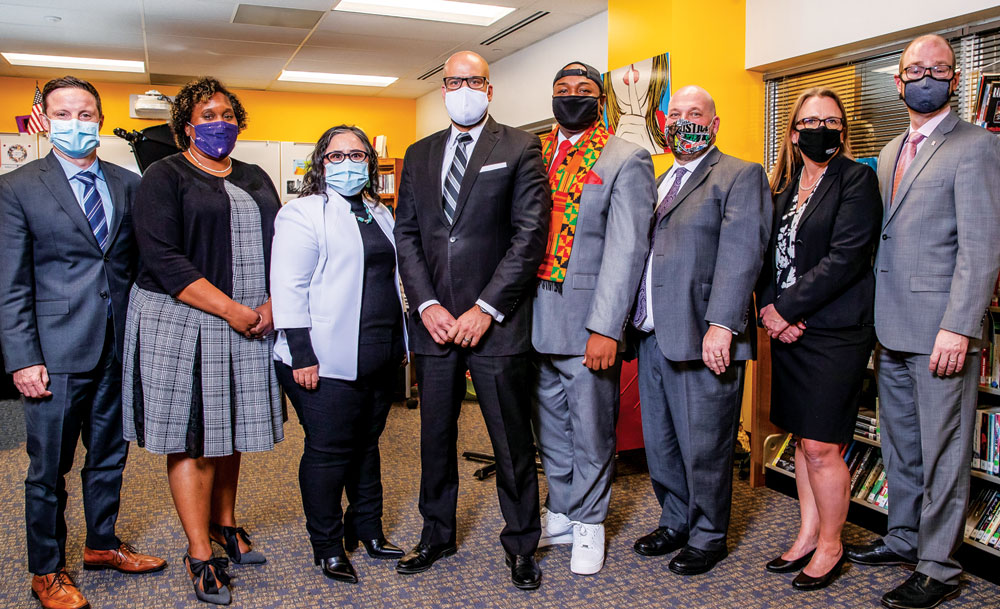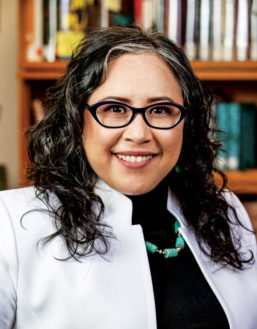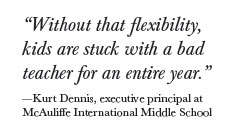
Denver Public Schools Board (left to right): Scott Baldermann, Michelle Quattlebaum, Xóchitl “Sochi” Gaytán, Supt. Alex Marrero, Tay Anderson, Scott Esserman, Carrie Olson, and Brad Laurvick. Photo courtesy of the Denver Public Schools Board
The Denver Public Schools board wants to yank much of the power to innovate from the district’s innovation schools.
The board is seeking input at two community meetings this month, but it is expected to approve the move later in March.
Board members say they worry teachers are losing rights because of the waivers from the union contract given to innovation schools.

Xóchitl Gaytán, Board President, District 2
“Nationwide, we’re seeing a demonization and disrespect for the teaching profession,” said board President Xóchitl “Sochi” Gaytán. “This is an opportunity to weave equity into a system, especially for teachers and to bring back respect to the teaching profession.”
Innovation leaders disagree that their teachers are being disrespected.
Kurt Dennis, executive principal of McAuliffe International Middle School, believes the board’s main goal is to eliminate the freedom innovation principals have to fire teachers. Depending on the waiver, principals can let go of teachers right away if they’re not a good fit. Most innovation teachers are hired on annual contracts. Teachers in traditional schools can be fired only for cause, according to the union contract.
“In nine years—and I have a staff of over 90 teachers—I think we’ve executed that policy five times,” Dennis said. “That’s less than 1 percent of teachers, so it’s not something that’s being abused. And I can assure you, in those situations, it was very necessary.
“Without that flexibility, kids are stuck with a bad teacher for an entire year.’’
Brent Applebaum, principal at Creativity Challenge Community, said besides a retiree and one teacher becoming a counselor, he has a 100 percent teacher retention rate. In a recent survey 100 percent of his teachers said they felt empowered to do their job.
 Renard Simmons, principal at DC-21, said, “Our high teacher retention rates speak to the respect we give our teachers.”
Renard Simmons, principal at DC-21, said, “Our high teacher retention rates speak to the respect we give our teachers.”
The board’s plan would impact ten Northeast Denver schools: Swigert, Willow, Inspire, Isabella Bird, Ashley, Montclair School, Denver Discovery, Denver Green School-Northfield, McAuliffe International, and Northfield High School. They are among the 52 DPS innovation schools that enjoy a level of autonomy from the district, which allows them to decide what is best for their students.
All waivers from a union contract have to be approved by a vote of the school staff with at least 60 percent of union members at that school voting in favor.
Among those flexibilities:
- Control of their budgets and spending.
- Longer school year.
- Flexible scheduling.
- Control over what and how they teach.
- Teacher training tailored to their needs.
- The ability to fire teachers.
“Principals recognize a one size fits all approach where you’re mandating everything from the top down for 90,000 (DPS) students across 200 schools doesn’t work,’’ said Kurt Dennis, executive principal of McAuliffe and lead founder of the Northeast Denver Innovation Zone in 2018, that includes McAuliffe, Swigert, and Northfield. “Principals and teachers on the ground used to be the change agents, not districts.”
But much of that self-governance, which is accomplished primarily through waivers to the union contract, would end if the DPS board essentially neuters the district’s policy on innovation schools.
All seven board members are backed by the teacher’s union. The board has opposed previous reforms and has dismantled or stopped key initiatives dating back to the mid-2000s.
The board’s proposal would require that all teachers, in innovation or traditional schools, have a workload “commensurate with a 40-hour work week” and have “minimal non-teaching duties,” and principals could no longer offer “additional pay to teachers for high student test scores or top school ratings.”
According to Boardhawk, an online news site focused on DPS, pay would “correlate with teaching/classroom experience. In other words, stick to the salary schedule and don’t reward teachers who excel at their work,” Boardhawk said. “Another dagger to the heart of innovation schools . . . would require the schools to adhere to the DPS calendar without deviation” prohibiting the extra instructional days local innovation schools have.
“Now they’re forcing school leaders to become middle management,” Dennis said. “The district is like, ‘Here’s your directive. Present it to your staff at this time, on this day, with this training. Here’s the curriculum for your students.’
“We’re all just delivering the message from central admin, and the staff groans because they know it doesn’t work for their kids and their community.”
Board President Gaytán promises they will conduct community engagement as part of their decision process. She said they sent out surveys to principals and teachers and are meeting one-on-one with innovation leaders and other stakeholders. She also said they’re hosting two town halls, March 1 and March 3. (Go to dpsk12.org for information on meetings.)
Gaytán, who drafted the proposal with board member Scott Balderman, said the proposal does not limit innovation within schools.
“I know there’s been concern about how this could potentially limit innovative programming or innovative ways of being able to provide a quality learning environment for students,” Gaytán said. “That’s not what this is.
Innovation principals are baffled about the real issue. The board has struggled to articulate its motivations and even how they will gather that genuine community input they say they want.
“I have to justify my innovation practices, but there’s no reason why,’’ said. Sheldon Reynolds, principal of The Center for Talent Development (CTD). “I have one of the highest school performance ratings and one of the highest [teacher] retention rates, but not one person from the board has engaged me.
“How can we look at a [proposal] of this magnitude when you don’t have a clear direction of how policies are going to be put in place or how you’re going to engage the community.




Make no mistake, this is a threat to Innovation schools. These schools are nimble and flexible because of waivers and are able to meet the unique needs of their students because of flexibility. I’m wondering if this new Board is trying to push families to private schools because Innovation schools are a like alternative. Most importantly, WHERE IS THE DATA?? How is this putting children first, is there data to prove teachers are unhappy, is there data showing these models are hurting student performance? NO! Another example of a “done deal” before the Board even listens to the community or even the teachers at Innovative schools.
You should ask teachers from various schools what they think. Oh wait… They might get fired.